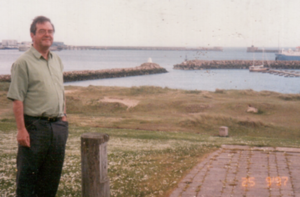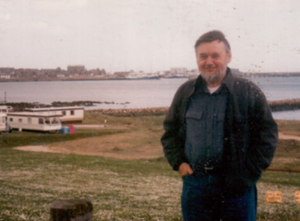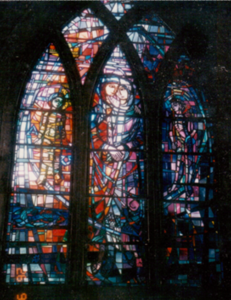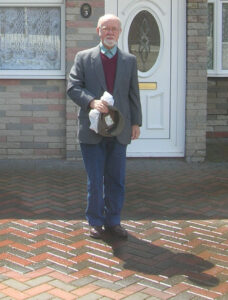Sunday, June 8,2003
So here I am alone again. I take a nap, then let myself out to walk. I walk up and down the streets of Inverness looking with no success for a place to eat. (It is early for supper, and I am picky.) I finally find a hole-in-the-wall Chinese place that is mostly but not entirely take-out. It has a couple of tables. I have chicken and corn soup, Kung Bo chicken and Chinese tea. Delicious. I walk back to the B&B. shower, lay out clothes for the morning, and pack.
I spend some time running through the “river of life and health” meditation, then removing psychic cords to and from everyone I ever made an agreement with that does not now serve me and others. If I am to do my work, I need my energy. I cannot have it siphoned off or – it occurs to me – diverted into cliched paths.
I go to bed, and wake at 11:30 p.m. to note an image from a dream. A three-story-high pitcher surrounded by a tree, in the countryside. The pitcher surrounded by some liquid – water? – for the countryside. I note, “Robert will know.” The next morning, it occurs to me the image may have been a pun: “the big picture is contained within the big three.”
Monday, June 9
At 2:45 a.m. The only thing I remember from this rather entertaining dream is giving my old college friend Dennis a boot in the tail because he got me in trouble with the congressman I am working for. I tell him that when I’m 83, I’ll still be circling round him to avoid the return kick. At 6:40 I note that I visited my friend Kelly during the night, I think, and did the water meditation for and with her. At 7:15 I am up, packed, waiting for breakfast and the start of the day. I pull out my journal.
“So – friend David – we were interrupted in a very interesting conversation some while ago – when the plane landed in Aberdeen.” And we are off on a discussion of the relationship within us between other lives. David says, “You have within you connection to every other lifetime you are primarily connected with. Which ones you are connected with is in itself a measure of you as an individual. This may not be obvious. Those you are closest to will most closely influence you. This is how it will seem to you. And if you are compounded of primary influences that hate each other’s values, you will find yourself a battlefield, and maybe one side or the other will be overwhelmed, or maybe they will fight over every little thing, or maybe your life can be a means of reconciling them. But in whatever case, you are primary because you are at the point of application, the present from your view of reality. For each of the influences in motion, each of them is the one in the point of application, and you are the influence from afar. So it is continual flux and war of movement, you see.”
“I am sitting here in the front room of the B&B waiting for breakfast to begin in a few minutes, wishing I were the man I saw in the mirror after we visited Pluscarden.”
“And maybe he has reason to wish you could make the trade.”
Breakfast proves interesting. There are two couples from Sweden, on a driving holiday, having come over on a 24-hour ferry. They aren’t quite sure they’d ever heard of Swedenborg, though part of that may be my pronunciation. When I ask them what their religion is (they not having heard of Swedenborg) they look puzzled and say “Christian.” I say, “Catholic,” and they are a bit shocked and say no. Then I remember and say, “Lutheran” and they agree. “Christian”: The reply bespeaks a uniformity of culture we don’t have and I wouldn’t want.
In a while I am on the bus to Fort William. I say to myself, “what a luxury, to be traveling alone,” and I hear the words and wonder why I am so often tempted to again join my life to someone else’s rather than giving it to all and none.
On the bus, I interrupt my reading of Bede’s Life of Cuthbert to mull over something David had said. “Well, it is curious, but I have felt those unconscious or semi-conscious urges, or curiosities, yet even as I have felt them, I have felt that they were somehow not me and not mine. If they well up from not the so-called subconscious but from our connections to other lives of ours, this would make sense.” But it is too hard to write on the bus, so I return to reading, and finish Bede on Cuthbert. I understand Cuthbert, and I rather think I understand Bede, which is something I suspect the educated of our day may find impossible to do. I have a nice lonely trip to Fort William.
We immediately transfer to another bus that will take us to Oban, but this trip is not solitary. I am chatted up by a Scot who had lived in Mull 10 years and in Canada for three. He was born in 1937 – just nine years before me – and is retired from a career as an engineer (among other things). He remembers the Yanks being all over Glasgow, in a part of town the Germans had bombed, which had then been cleared for the American cantonments. He remembered them maneuvering all over, driving their four-bys, and then suddenly disappearing and never coming back. After D-Day, of course.
We reach Oban at 1:15, and I buy a ticket for the Caledonian MacBrayne car and passenger ferry to Craignure, on the Isle of Mull. (CalMac runs all the ferries to the western islands.) I sit with my journal on the jetty, catching up. At about 4 the ferry leaves. For some reason, all that goes through my mind, the whole trip over, is Auld Lang Syne, playing non-stop. What’s that all about? I watch the wake of the boat organize itself into more or less parallel lines, which quickly dissolve and form new arrangements and non-arrangements. Within the pattern are patches of whitish-green alternating with the deep green that is around them, and is outside the wedge of wake. And atop the green and the whitish green is white foam in intricate patterns like lace. It could be part of a lovely painting.
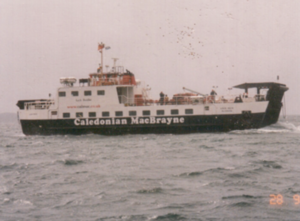
A Cal-Mac ferry
It’s about a 40-minute trip, and I enjoy it greatly. The ferry boat is big enough, and broad enough, and the waters protected enough, that it is a very smooth ride. Three decks to the ferry, with a restaurant, a snack bar, a gift shop, you name it. There is even a small arcade with video games for the teenagers. You can stay inside on padded upholstery or can go up to the outer deck at the stern and sit on benches and participate in the day. A majority of the people choose to be outside. I find it chilly, but I’d have to be carrying my coat in any case (nowhere to pack it) so it isn’t a problem. Of course, while I’m in a coat and none too warm, others are in shirtsleeves and seem quite comfortable.
At the very end of the trip, as we are organizing ourselves to debark, a 30-year-old kid strikes up a conversation with me. He had been listening to my conversation with the man on the bus, and was also going to Iona. We sit on a bench in front of the little tourist center, having an hour to wait for the bus that will take us across the southern end of Mull to Fionnphort and one last ferry ride to Iona. He had just graduated seminary, was engaged to be married, and was taking his last summer of freedom to travel around Europe. Our conversation is not entirely comfortable; too many theological areas that we have to step around. After a while an elderly Scot and his wife sit down next to me, and he and I get talking about the war, D-Day, Churchill, etc. He had worked for Union Carbide, and in the 1950s or ‘60s had visited their plant in West Virginia. Then comes the bus, about an hour and a half ride, and book and journal.
“So, David, how do I deal with this boy, besides being friendly and open?”
“Nothing more needed than that. Don’t be afraid to say what you believe – as you have been doing. It will be all right, and it will help you, too, to speak your truth. Good practice – or how do you expect to deal with the bus?” [Later I look at this entry and wonder what word was meant, that I wrote as “bus.” Maybe it meant, people in general, such as were represented by the other passengers.]
Fionnphort is a little place I never do get to see – any more than Craignure, Oban or so much that I pass through. A five-minute ferry ride and I am walking up the concrete pier onto the Island of Iona.
My first view of the island, from the ferry, is disconcerting, an English-looking countryside: a series of ordinary houses strung along the coast, each surrounded by neat fenced fields. It looks so domestic, especially after Mull’s deserted look. So what did I expect? Something wilder, certainly.
Within minutes I am at the Finlay Ross B&B, then across the way for an expensive but good supper. As I eat, I recapitulate the trip so far. It has been wonderful – mostly because of seeing Robert and Michael. I am very glad I penciled them into the trip. I sit and watch the sea through fogged windows. I have been too long away from the sea. I take a short walk, but it is really too cold for the clothes I am wearing. I worry about having trouble with asthma, so I retreat indoors for the night.
